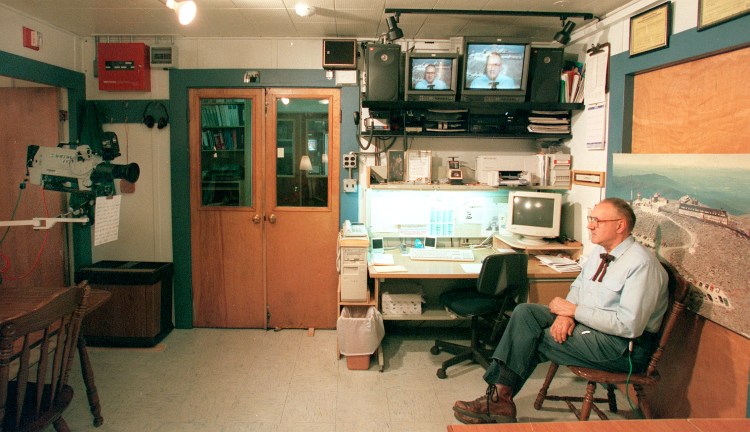Though he gave TV weather reports seen across northern New England for 38 years and was recognized wherever he went, Marty Engstrom was quick to tell people he was not a weatherman.
A broadcast engineer by training, Engstrom reluctantly began giving weather reports for Portland station WMTW from the station’s broadcast tower atop Mount Washington in New Hampshire in 1964. With a Maine accent so thick some viewers thought it must be fake, Engstrom wore a clip-on bow tie and read his reports from hand-written cue cards he taped to the camera. His folksy, unpolished style made him a hit with viewers, and he became known to generations of Mainers simply as “Marty on the Mountain.”

Marty Engstrom broadcast weather forecasts from Mount Washington for 38 years. Photo courtesy of WMTW
Engstrom, who retired from WMTW in 2002, was inducted into the Maine Association of Broadcasters Hall of Fame in 2019. He died Thursday at his home in Fryeburg, at the age of 86, said his daughter, Anita Williams.
Williams said her father gained a deep love and appreciation for weather from his time on Mount Washington and had kept a daily weather log in his Fryeburg home for the past 20 years. But he didn’t always seem to understand or acknowledge how popular and well-known he’d become.
“He was very humble. People would come up to him excited and say ‘Oh, you’re Marty Engstrom’ and he’d just say ‘Yup'” said Williams, of Fryeburg. “We’d tell him, “Dad, you’re famous, people know who you are.”
Engstrom grew more comfortable with his celebrity over time, said Steve Minich, an anchor at WMTW (Channel 8) since 1991. Engstrom even wrote a book about his long and unexpected career, “Marty on the Mountain: 38 Years on Mount Washington.”
Minich remembers early in his tenure attending a banquet with other WMTW anchors and Engstrom. When Minich and the other anchors were introduced, they got polite applause. But when Engstrom was announced, “the place went wild, everybody cheering,” Minich said.
“He’s the one people loved. What you saw was what you got with him, and I think people knew that,” Minich said.
Engstrom grew up in Fryeburg, where his parents worked at a nearby corn canning plant, his daughter said. He left home to join the Air Force, where he was a weapons control technician. When he finished his time in the service, he got a commercial radio license and began looking for jobs with local TV and radio stations. He landed a job running WMTW’s transmitter on the summit of Mount Washington, about 6,200 feet high and home to some of the worst weather in the country.
In the days before cable, satellite and streaming services, TV stations broadcast their signals to homes over the air, and WMTW’s summit tower allowed it – and Engstrom – to reach viewing households all over northern New England and even into Canada.
On his very first day of work, Engstrom was told that besides driving up the mountain and running the transmitting equipment, he’d have to give daily on-air reports about the summit’s weather, to be shown on the evening newscast.
His response, he told Minich and others, was “What? Me?”
“After the first few times they told him, ‘Come on, you’ve got to put some personality into it, smile,'” said Minich, who interviewed Engstrom about his career. “So he forced a smile at the end and that became his trademark.”
Minich thinks the contrast between Engstrom and most other local TV personalities was part of what endeared him to viewers. News anchors wore pressed suit jackets, had perfectly styled hair, and spoke with broadcast school diction. Engstrom spoke slowly as he read his 30-second report, with a heavy Maine accent, and wore a clip-on Western-style bow tie.
While anchors have video and flashy background graphics to augment their reports, Engstrom sat in front of a cardboard backdrop picturing the old Summit House Hotel on the mountain. His reports included the visibility, wind speed and temperature on the summit that day. Since he worked alone in a small building on top of the mountain, he wrote the report himself, taped it to the camera, and then sat in front of the camera to go on air.
Engstrom lived on the summit for a week straight, then would drive down the mountain to spend a week at home. Williams said her family marked weeks on the calendar with “U” or “D” for up or down, so they’d know when Engstrom would be home. The station began broadcasting from a tower in Baldwin in early 2002, just before Engstrom retired.
“He was definitely unique – no one will argue that. I remember people asking me if he really talked like that. They couldn’t believe his accent wasn’t put on,” said Tim Moore, president and CEO of the Maine Association of Broadcasters. “But he was the real deal.”
Copy the Story LinkSend questions/comments to the editors.




Success. Please wait for the page to reload. If the page does not reload within 5 seconds, please refresh the page.
Enter your email and password to access comments.
Hi, to comment on stories you must . This profile is in addition to your subscription and website login.
Already have a commenting profile? .
Invalid username/password.
Please check your email to confirm and complete your registration.
Only subscribers are eligible to post comments. Please subscribe or login first for digital access. Here’s why.
Use the form below to reset your password. When you've submitted your account email, we will send an email with a reset code.